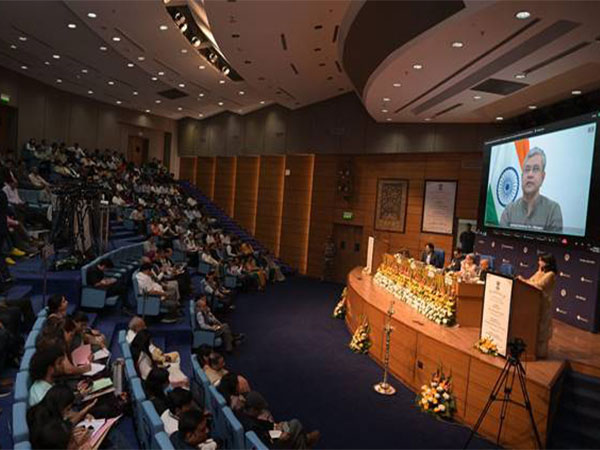. |
Updated: Nov 16, 2024 22:03 IST
New Delhi [India], November 16 (.): Union Minister of Information and Broadcasting, Railways, and Electronics and Information Technology Ashwini Vaishnaw on Saturday chaired the National Press Day celebrations at the National Media Centre virtually, a press release said.
The event was also graced by the presence of Union Minister of State for Information & Broadcasting and Parliamentary Affairs, Dr L. Murugan, Chairperson of the Press Council of India, Secretary, Ministry of Information & Broadcasting, Justice Ranjana Prakash Desai and veteran journalist, Kundan Ramanlal Vyas.
According to the Ministry of Information & Broadcasting, Vaishnaw while addressing the gathering virtually highlighted India’s vibrant and diverse media ecosystem, which includes 35,000 registered newspapers, numerous news channels, and a robust digital infrastructure. The Minister noted that investments in 4G and 5G networks have propelled India to the forefront of digital connectivity with the lowest data prices globally.
However, he pointed to four key challenges our society is facing due to the changing landscape of media and press.
The spread of fake news undermines trust in the media and poses a threat to democracy. During his address, Vaishnaw raised a critical question on the rapid growth of digital media and the responsibility for the content published on these platforms. The concept of Safe Harbor, developed in the 1990s when the availability of digital media was limited to select users in universities and research institutes, provided immunity to platforms from being held accountable for user-generated content.
He mentioned that globally, debates are intensifying over whether the Safe Harbor provisions are still appropriate, given their role in enabling the spread of misinformation, riots, and even acts of terrorism. “Shouldn’t platforms operating in a context as complex as India adopt a different set of responsibilities? These pressing questions underline the need for a new framework that ensures accountability and safeguards the social fabric of the nation.”, he added.
The shift from traditional to digital media has financially impacted conventional media, which invests heavily in journalistic integrity and editorial processes. Vaishnaw highlighted the need for fair compensation for traditional content creators, addressing the asymmetry in bargaining power between digital platforms and conventional media. “The efforts made by the conventional media in creating content needs to be fairly and suitably compensated”, he said.
Algorithms driving digital platforms prioritize content that maximizes engagement, incites strong reactions and thereby defines the revenue for the platform. These often amplify sensational or divisive narratives. The Union Minister highlighted the social consequences of such biases, particularly in a diverse nation like India, and called on platforms to come up with solutions that account for the impact their systems have on our society.
The rise of AI presents ethical and economic challenges for creators whose work is used to train AI models. Vaishnaw highlighted the significant upheaval the creative world is facing due to advancements in artificial intelligence.
Addressing the challenges posed by AI systems, he emphasized the need to safeguard the intellectual property (IP) rights of original creators. “AI models today can generate creative content based on vast datasets they are trained on. But what happens to the rights and recognition of the original creators who contributed to that data? Are they being compensated or acknowledged for their work?” the Minister questioned. “This is not just an economic issue, it is an ethical issue too”, he added.
Vaishnaw urged stakeholders to engage in open debates and collaborative efforts to address these challenges, transcending political differences. He emphasized the importance of preserving the media’s role as a strong pillar of democracy and building a harmonious and prosperous Viksit Bharat by 2047.
Highlighting the evolution of journalism from traditional print to satellite channels and now to the digital era, Dr. Murugan noted the speed at which news reaches the public today. However, he emphasized the growing challenge of fake news, which he described as spreading “faster than a virus.” Fake news, he cautioned, threatens national integrity, undermines the military, and challenges Indian sovereignty.
Acknowledging the role of smartphones in transforming every individual into a potential content creator, Dr Murugan stressed the need for greater responsibility and regulation in combating misinformation. He reaffirmed that while freedom of speech and expression is guaranteed by the Constitution, it must be exercised with accuracy and ethical responsibility.
Murugan applauded the government’s efforts under Prime Minister Narendra Modi, including the establishment of a Fact Check Unit within the Press Information Bureau (PIB) to authenticate news and counter false narratives.
Sanjay Jaju, Secretary, of the Ministry of Information and Broadcasting highlighted the government’s initiatives aimed at supporting journalists, including accreditation, health and welfare schemes, and capacity-building programs through institutions like the Indian Institute of Mass Communication (IIMC).
He also noted reforms such as the Press and Registration of Periodicals Act, of 2023, which modernizes media regulations. Efforts to improve information access through regular press briefings, web screenings, conferences etc were also emphasized. He also called for collective efforts to build a fair, transparent, and sustainable press ecosystem that upholds journalism as a beacon of truth, a platform for diverse voices, and a catalyst for positive change in society.
During her address, Justice Ranjana Prrakash Desai highlighted that the wider availability of digital platforms and the consistent use of spiritual media, blogs, and podcasts have greatly expanded access to news and information. This has not just made life easier but also brought challenges with it and it is in this regard that accurate news must reach us on time.
She mentioned that the Press Council of India has taken steps aimed at maintaining journalistic integrity, protecting public interest, and ensuring that the media serves as a reliable and ethical platform for information. She further emphasized the awards and internship programs run by the PCI. “This year, 15 journalists received National Awards of Excellence across various categories and the initiatives of PCI aim to promote talent, and ethical growth in journalism, but also promote a sense of responsibility and awareness among aspiring journalists,” she added. (.)

